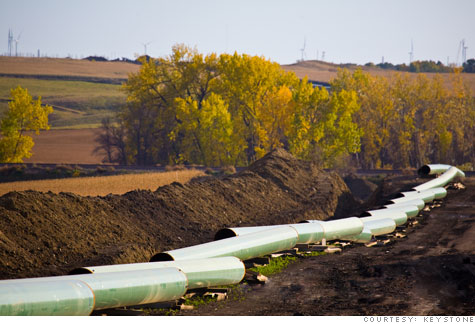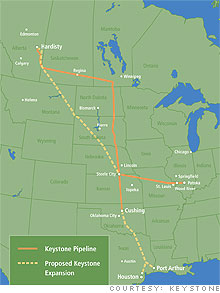Search News
 The existing portion of TransCanada's pipeline under construction in North Dakota.
The existing portion of TransCanada's pipeline under construction in North Dakota.
NEW YORK (CNNMoney.com) -- In the coming weeks, the Obama administration will decide if it wants to significantly increase the amount of oil the country imports from Canada's controversial Alberta oil sands.
The State Department is set to issue what could be a final ruling to allow a massive new pipeline expansion from central Alberta to the Gulf of Mexico. A decision is expected early in the new year.

Known as Keystone, the project is an expansion of an existing pipeline that now terminates in Oklahoma. Stretching over 1,600 miles -- twice the length of the Trans-Alaska system -- the new pipeline would be one of the biggest in the country.
Canada's oil sands have drawn numerous critics who say the way the oil is extracted harms the environment.
But they are also the United States' largest single source of foreign oil, contributing over 1 million barrels a day. If built, the pipeline would boost that number by a third.
The pipeline would also be the oil sands' first major access to a deepwater seaport, opening up access to worldwide markets.
Supporters say the Keystone pipeline would create jobs and let the country replace Venezuelan or Middle Eastern imports with well-regulated, dependable Canadian crude. They also say if the United States doesn't want the oil, the Chinese will gladly take it.
Opponents, who have just wrapped up a $500,000 ad campaign in the D.C. area, say the project would bind the country to an unnecessary and dirty form of oil for decades to come.
The State Department is expected to issue an environmental impact statement on the pipeline early in 2011. State must also determine whether the pipeline is in the national interest -- weighing economic, environmental and energy considerations.
Opponents aren't necessarily against the pipeline itself. Instead, they oppose the expansion of oil sands production it would allow.
"We see this as a disaster on many levels," said Ryan Salmon, energy policy advisor at the National Wildlife Federation, one of several environmental groups fighting the pipeline.
The chief knock against oil sands is that they create more greenhouse gases than regular oil.
Oil sands are just that -- sand mixed with a heavy form of crude. They are found in Canada's Alberta province, covering an area roughly the size of Texas. They are either mined like coal or produced with wells like oil.
If they are mined, vast amounts of water and heat are necessary to separate the oil from the sand. If they are extracted by well, it's often necessary to heat up the rock to get the thick oil flowing.
Either way, extracting oil sands is considerably more energy intensive than pumping normal oil.
On a lifecycle basis, from the extraction process on through to burning the stuff in a motor vehicle, oil sands are estimated to emit 5% to 30% more carbon dioxide than regular oil.
Oil sand extraction is also tough on the landscape, especially if it's mined. The mines are huge, roughly the size of Rhode Island. They have resulted in deforestation of hundreds of square miles of wilderness, at least until the sites are replanted.
Processing the oil also requires thousands of acres of ponds filled with toxic mine tailings. Birds are prone to landing in these ponds, Salmon said, and thousands are killed each year. The runoff can also pollute nearby waterways.
"At the site itself, you're looking at basically wholesale destruction of the ecosystem," said Salmon.
For Salmon and others opposed to the project, the country would do better to put its resources into alternative technology or conservation measures.
Supporters say the companies producing oil sands and the Canadian government are getting better at protecting the environment but a recent Canadian government report says more monitoring is needed.
They note that much new oil sands production is done using techniques similar to normal oil drilling, which minimizes the land disturbance and the need for so much water.
Others point out that Canada's oil comes relatively free of the taint of the complications that arise from oil that comes from unstable parts of the world.
"It's not blood oil," said Peter Tertzakian, chief energy economist at ARC Financial, a Calgary-based private equity firm. "It's clean from a political perspective."
The company that wants to build the pipeline, TransCanada, didn't want to comment on the issues involving production.
But it did highlight the economic benefits -- 13,000 construction jobs, millions in taxes to the communities it crosses, and $20 billion ultimately injected to the U.S. economy over the lifetime of the project.
"This is going to be new additional crude oil for domestic use," said Terry Cunha, TransCanada's spokesman.
And with oil supplies dwindling, the United States is not the only country eyeing Canada's oil sands.
The Chinese, or some other Asian country, will ultimately build their own pipelines to tap that oil, said Tertzakian, the oil industry economist.
Canada's oil sands producers, aware of the hostility their product faces in the United States and of the fast-growing Asian markets, are dying to diversify.
And the Asians are helping them along, investing over $16 billion in Canadian energy projects in the last 16 months alone.
"With this investment is a certain expectation that they will have access to this resource," he said. ![]()






| Index | Last | Change | % Change |
|---|---|---|---|
| Dow | 32,627.97 | -234.33 | -0.71% |
| Nasdaq | 13,215.24 | 99.07 | 0.76% |
| S&P 500 | 3,913.10 | -2.36 | -0.06% |
| Treasuries | 1.73 | 0.00 | 0.12% |
| Company | Price | Change | % Change |
|---|---|---|---|
| Ford Motor Co | 8.29 | 0.05 | 0.61% |
| Advanced Micro Devic... | 54.59 | 0.70 | 1.30% |
| Cisco Systems Inc | 47.49 | -2.44 | -4.89% |
| General Electric Co | 13.00 | -0.16 | -1.22% |
| Kraft Heinz Co | 27.84 | -2.20 | -7.32% |
|
Bankrupt toy retailer tells bankruptcy court it is looking at possibly reviving the Toys 'R' Us and Babies 'R' Us brands. More |
Land O'Lakes CEO Beth Ford charts her career path, from her first job to becoming the first openly gay CEO at a Fortune 500 company in an interview with CNN's Boss Files. More |
Honda and General Motors are creating a new generation of fully autonomous vehicles. More |
In 1998, Ntsiki Biyela won a scholarship to study wine making. Now she's about to launch her own brand. More |
Whether you hedge inflation or look for a return that outpaces inflation, here's how to prepare. More |